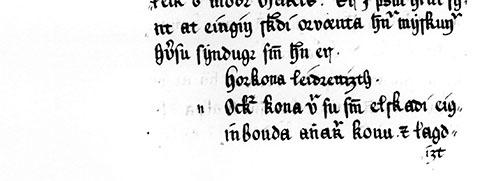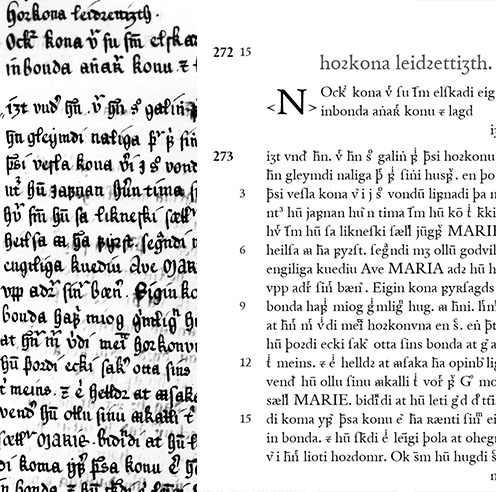An adulteress is reformed
In this week's miracle, the Virgin Mary teaches a scorned wife and an adulteress that there are more important things in the world than men.

“Hórkona leiðréttisk” (An adulteress is reformed) marks the beginning of this week's miracle. (Click on the picture for a larger version.)
This week’s miracle derives, like many others, from Vincent de Beauvais’ Speculum Historiale (Book VII, chapter 100). It concerns a man who is so obsessed with his mistress that he neglects his wife, causing her great suffering. Known internationally as “Wife and mistress” (Poncelet no. 1135), the story focuses not on the man, but on the two women, both of whom are devoted to the Virgin Mary.
The miracle is found on pp. 272-76 of AM 675 4to, volume two of our manuscript, and is printed in Unger’s Maríu saga, pp. 1027-28. The rubric reads “Hórkona leiðréttisk” (An adulteress is reformed), which is slightly misleading, as the whole point of the story is that both women, through the intervention of the Blessed Virgin Mary, are reformed and reconciled. What happens to the man, not untypically, is not mentioned.
The end of the tale is also found in AM 240 VIII fol., from the second half of the 14th century.
There is another Old Norse-Icelandic version of this story preserved in four manuscripts, including Stock. perg. 4:to nr 11, from the middle of the 14th century, which is printed in Maríu saga, p. 274. This version is based on the Liber de laudibus Beatae Mariae of Guibert de Nogent (c. 1055-1124).
Nøkkur kona var sú, sem elskaði eiginbónda annarrar konu, ok lagðisk undir hann. Var hann svá galinn fyrir þessi hórkonu, at hann gleymdi náliga þar fyrir sinni húsfrú. En þó at þessi vesla kona væri í svá vándum lifnaði, þá minntisk hún jafnan hvern tíma, sem hún kom til kirkju, hvar sem hún sá líkneski sælar jungfrú Maríu, at heilsa á hana fyrst, segjandi með ǫllum góðvilja engilliga kveðju 'Ave Maria', áðr hún hóf upp aðrar sínar bœnir. Eiginkona fyrrsagðs bónda hafði mjǫg grimligan hug á henni, harmandi at hennar maðr virði meira hórkonuna en sik. En því at hún þorði ekki, sakir ótta síns bónda, at gera henni til meins, ok eigi heldr at ásaka hana opinberliga, vendir hún ǫllu sínu ákalli til várar frú, Guðs móður, sællar Marie, biðjandi, at hún léti Guð dróttins reiði koma yfir þessa konu, er hana rænti sínum eiginbónda, ok hún skyldi eigi lengi þola at óhegndr væri hennar ljóti hórdómr. Ok sem hún hugði sik með sínum iðuligum gráti mundu hafa uppvakit mót henni reiði himinríkis dróttningar, þá vitrask henni sú sjálf blezaða jungfrú í draumi, ok sagði til hennar: "Sakir hvers biður þú af mér dagliga með miklum góðvilja at hefnd komi yfir þá konu? Ek má ekki gera þat, er henni sé í mót, því at hún boðar mér þann minn fagnað, sem engin skepna má mik svá heilsa at mér sé þekkara; eðr hyggr þú at ek skal vera þeirri reið fyrir þína skyld, er mik vekr upp til fagnaðar, minnandi mik á mína óumrœðiliga dýrð." Sem konan heyrði þetta af várri frú, lét hún af at biðja þess sem fyrr bað hún. En einn dag berr svá til at hennar elja kemr í mót henni í nøkkurum stað. Hún talar þegar til hennar hǫrðum orðum, á þenna hátt: "Þú hin fúlasta púta gerir mér mikinn harm, dagliga, er með þínu saurlífi slítr brott af mér mitt eigit kjǫt, minn bónda; en tér mér þína nærveru, dirfandisk at fara í mót mér, er ek hata umfram alla hluti. Svo gjarna vildi ek ok, en heldr væri skyldugt, at ek píndi þik, því at þú gengr dagliga ok gerir harm mínu hugskóti, svá eyrunum ok augunum. En síðan ek þordi ekki at atgera, var sú ein mín ván til hefndar at Guðs móðir mundi þik dœma með sinni reiði, en sjálf hún sagði mér at sú sama kveðja, sem þú ert hvern dag vǫn hana at heilsa með, blíðkaði hana svá mjǫk at hún vildi engi harðindi þér gera." Sem hún heyrir þetta leitar hún eptir sem vandligast hvort þetta er satt, ok síðan segir hún: "Vit fyrir víst, at heðan af skal ek eigi elska þinn bónda, ok eigi skal hann nøkkura líkamsmunúð við mik drýgja, þér til angrs. Heldr heit ek ok þar með þeirri, sem fyrir mína litla þjónustu veitti mér svá mikla miskunn, skal ek fyrir hennar elsku lifa hreinliga heðan af." Ok sem hin hélt hreinlífi, lagði þessi niðr allan sinn harm ok kæru. Gerði þetta, báðum þeim til æru, sú sem blezuð er umfram allar konur, Guðs móðir María.
Which in a fairly literal translation reads:
There was a woman who loved the husband of another woman and lay with him. He was so taken with this adulteress that he nearly forgot his wife because of this. But even thought this wretched woman lived such a wicked life, every time she entered a church, where she saw the image of the Blessed Virgin Mary, she always remembered to greet her first, saying with all goodness the angelic greeting “Ave Maria” before she began her other prayers. The wife of the aforementioned husband had many grim thoughts about her, bewailing that her husband cherished this harlot more than her. But because she did not dare to do her any harm, or accuse her openly, for fear of her husband, she directed all her entreaties towards Our Lady, the mother of God, the blessed Mary, praying that she would let the wrath of Our Lord God fall upon this woman, who had stolen her husband from her, and no longer allow her hideous harlotry to go unpunished. And as she believed that with her constant lamentations she would rouse the wrath of the heavenly queen against her, then the Blessed Virgin herself appeared to her in a dream and spoke to her: “Why do you ask of me daily with much goodwill(!) that retribution should fall upon this woman? I cannot do anything which is antagonistic to her, because she offers me greetings in such a way that no creature could greet me in a manner that would be more pleasing to me. Or do you think that I should for your sake be angry with one who rejoices in me, reminding me of my indisputable glory.” When the woman heard this from Our Lady, she ceased asking for what she had asked for before.
But one day it happened that her rival came up to her in a certain place. She began straightaway to speak harsh words to her in this way: “You, vile whore, do me great harm, every day, that with your fornication you tear away my own flesh, my husband, and show yourself to me, daring to approach me, you, whom I hate above all things. I would so much like, and should in fact be obliged, to torment you, since you go round every day causing grief to my mind and to my ears and eyes. But since I dared do nothing in this matter, my only hope of retribution was that the mother of God would condemn you with her wrath. But she herself said to me that the greeting which you every day are wont to offer her pleased her so much that she could do you no harm.” When she heard this, she considered very carefully whether this was true, and then she said: “Know this to be certain, that from now on I shall not love your husband, and he shall not engage in carnal lust with me, which causes you to suffer. Rather I also promise this to her, who for my small services has shown me such great mercy: I shall for the love of her from now on live chastely.” And as the one kept chaste, so did the other lay down all her anger and complaint. This, to both their honours, did she who is blessed above all other women, the mother of God, Mary.

The master class prepared a transcription of the text in various layers. Click on the image to see a side-by-side of the manuscript and the master class's facsimile transcription.
Contact
The Master Class 2017 consisted of:
Johan Bollaert (Uppsala universitet), Anne Ladefoged (Københavns Universitet), Balduin Landolt (Universität Basel) and Ermenegilda Müller (Université de Genève / Háskóli Íslands).
They were supervised by Natalie Van Deusen (University of Alberta) and Matthew Driscoll (Københavns Universitet)
About the manuscript

AM 634-635 4to, written in Iceland in the beginning of the 18th century. It is a copy by sr. Eyjólfur Björnsson (1666-1746) of a now lost codex, presumably of the 14th century.
Vol. I, 254 leaves (195 mm x 164 mm), paginated 1-508; Vol. II, 256 leaves (195 mm x 164 mm), paginated 1-511. Leaves 19-48 in the first vol. are blank and were added by Árni Magnússon.
Contains Maríu saga (the Vita of the Blessed Virgin Mary), with miracles, 230 in all (80 + 150).
Read the full manuscript description on handrit.org.
